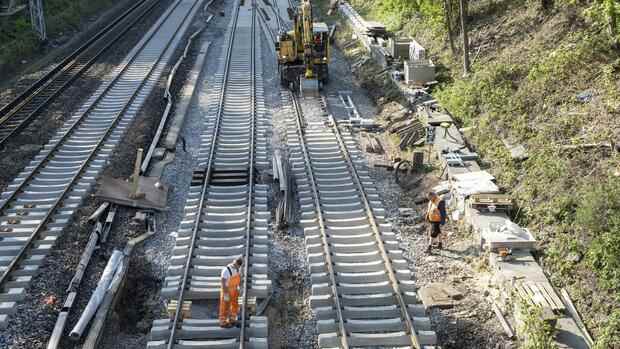Berlin Deutsche Bahn AG wants to completely overhaul its rail network and test its new concept on the heavily used route between Mannheim and Frankfurt. The decision to use the so-called Riedbahn as a pilot project is to be announced by Infrastructure Board Member Berthold Huber and Federal Transport Minister Volker Wissing (FDP) at a “Rail Summit” this Thursday in Berlin.
Railway boss Richard Lutz had explained that in future the railways would completely renovate sections of the network and would no longer wait for the end of the economic life of individual parts. A total of 14 busy corridors are to be renovated by 2030. In the Handelsblatt interview, he recently stated that the situation on the network was “unacceptable”.
In June, the railway had already informed the supervisory board that the Riedbahn should be the pilot project. The connection from Cologne to Dortmund is to be overhauled just as early.
Top jobs of the day
Find the best jobs now and
be notified by email.
It is also planned that the infrastructure for digital interlockings should be relocated at the same time. The other twelve projects are to be prioritized together with railway companies according to their urgency.
Full closure for five to six months
However, the measures each require a full closure of five to six months. Since this is likely to cause a lot of displeasure among the customers affected, the stations and reception buildings along the routes are to be modernized at the same time. In this way, customers would experience the benefit positively after the high load, it said. After that, there should be no more construction work on the route for “at least” five to eight years.
In June, Minister Wissing declared the general renovation of the rail network to be a “top priority”.
(Photo: IMAGO/Political Moments)
The Riedbahn project is expected to cost half a billion euros. It is to be financed via the service and financing agreement concluded between the federal government and the state-owned railway.
In addition, the federal government wants to provide another billion euros for “climate-friendly mobility” as part of the third relief package. The federal government could also use this to finance measures that increase network capacity. These include sidings for overtaking or more powerful tracks for higher speeds.
The construction industry welcomes Deutsche Bahn’s new strategy. Tim-Oliver Müller, General Manager at the German Construction Industry Association, said: “Bundled construction work and carrying out without partial closures helps the construction industry to use its capacities efficiently.”
>> Read here: Not enough money for future projects – the economy is dissatisfied with the new financial plan
However, he called for the money to be guaranteed regardless of the budget situation. “The federal government should set up a rail fund, and the railways should also examine, together with the federal government, what contribution the many hundreds of foreign investments will make to the future orientation towards the common good, and part with them if necessary. The proceeds should be invested in the rail network.”
Industry demands to create capacities with digital control
Deutsche Bahn has more than 500 holdings in Germany and abroad. The local transport subsidiary Arriva is already up for sale. According to federal plans, Deutsche Bahn is to divest itself of its highly profitable logistics company, DB Schenker. This alone could mean revenue of twelve to 15 billion euros, as it was said. So far, rail boss Lutz had insisted on all foreign participations that make a contribution to his “Strong Rail” concept.
Rail transport does not end at the national border, argues Lutz. “‘Strong rail’ means that the network operator gives an availability guarantee and does everything to ensure that customers can also travel on the rail network as promised,” countered construction representative Müller.
In the case of the railways, on the other hand, they have not forgotten what Federal Transport Minister Volker Wissing had said when presenting the new renovation strategy: the renovation would “not fail” because of the money, he said in June.
However, despite the extra billion euros, the budget does not provide significantly more money, at least for 2023. The cost of building materials has recently also risen sharply, which has an impact on construction prices.
The Federation of German Industries (BDI) is also concerned about this. For the industry, rail transport “plays a major role” in achieving the climate goals, it said. It is all the more important to quickly create more capacity in the network.
However, this cannot be solved “by classic infrastructure expansion alone”. Rather, as a network operator, the railways should quickly use “the dormant potential of digital capacity increases”. “Digital solutions ensure more reliability, higher capacity, higher efficiency, falling energy costs and more interoperability in Europe,” said the BDI.
The industry association emphasized that there are two basic requirements for shifting traffic to rail: “Reliability and punctuality.”
More: Fund recipients from the railways and donors from the federal government – a critical dual role for Werner Gatzer
